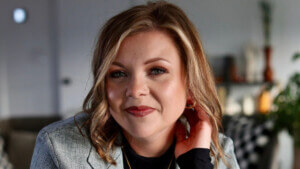Episode 279: Can Goodness and Wealth Go Hand-In-Hand? with Myra Salzer

When someone inherits money, you have to mourn the loss of your life as you have known it up until that time before you can move on. Most people don't think about that. They think, “Oh, $18 million, woohoo!” But it's a big change.
If the idea of making a lot of money scares you, because you think it will make you a jerk, today’s episode will give you insight into the mindset of heirs to incredible wealth.
At this moment, we have people who are afraid to make money, we have people who hate people who make money, we have people who have money who are afraid. We are leaving so much about our relationship with money unexamined.
We blow the relationship with wealth wide open: People with and without money are almost identical – not in their day-to-day, but how they view themselves. Our guest, Myra Salzer is an advocate for people who have received a significant inheritance.
Advocate for heirs to wealth
Since she founded the Wealth Conservancy, she has worked with inheritors who have collectively inherited billions. The firm's services combine life and wealth coaching, and financial planning for people who've inherited enough that paid work doesn't impact their financial well-being.
If you are thinking this doesn't apply to you, it does, especially if you are trying to grow your business and earn more money.
Myra says it’s important to recognize the people she works with don’t have an advocate, and they’ve been born into a situation they have no control over. They are stuck with their circumstances and their responsibilities, and they don't get any support.
“There's no manual on how to manage $50 million, or get shares of a family operating business or run a family foundation, and yet they're expected to be happy,” says Myra. “All of these things that most people don't even consider is what's required of them, and we advocate for them we work with them, we teach, we coach, and they get to a point where they can manage what they want to manage and delegate what they don't.”
Relationship with wealth
Myra notes that being an heir isn’t like winning the lottery. Usually, it’s a gradual event where the person becomes a beneficiary of a trust that might become liquid at a specific age. Or maybe they’ve always owned shares of a family business that does an IPO.
But there might be a sudden money event that they could have prepared for, but didn’t. Myra recalls one of her first clients as a financial planner. A young couple booked an appointment – he came in downcast that he didn’t have any income; she was playing with a large engagement ring on her finger.
Myra learned he’d lived off trust income for his whole life, but it terminated when he hit 35 years of age. He didn’t know what to do with the $18 million in the bank. Her ring was $60,000, and she was wearing it with the stone towards her palm – embarrassed at the thought of showing her father who couldn’t make a mortgage payment.
This appointment laid the foundation for Myra’s specialty.
“The amount of money doesn't matter. It's the impact it has on your life,” says Myra. “So it could be $100 to a homeless person. Or $1,000 to a recent high school graduate. If it impacts their standard of living, it's a lot.”
Net worth versus self-worth
Business owners can get insecure about money. There’s this idea that if you have money, you must somehow be bad. Myra says she sees this with her clients as well.
Their net worth and self-worth are misaligned, and they are afraid of judgments. This might mean hiding their wealth, because they want to fit in.
This is true on the other side of the financial spectrum as well. Whether you’re born into wealth or poverty, there’s a pattern of thought that says you’re just supposed to know what to do about money, and we’re not supposed to talk about it.
We have people who are broke who are pretending to be wealthy, and we have people who are wealthy pretending to be broke.
Inheritance stage progression
Myra breaks down the five stages of inheritance progression as: innocent stage, denial, ignorant acceptance, learning, growing and integrated authority.
No matter what our financial circumstances, we're all born in an innocent stage where we get everything we need, whether it's mother's milk or a clean diaper. Most of us have to get out of that innocent stage the first time we're told no, says Myra.
Whereas for someone who comes from a family of wealth, it's oftentimes much easier to write the check than to tell your child no. This means people can stay in the innocence stage for years.
From there, is the denial stage. People might want to pretend they don’t have money, or that people will dislike them for having it. Then comes ignorant acceptance – this is where Myra steps in to help. People have accepted their financial circumstances, but they have no training.
But this moves people to the learning growing stage and finally the integrated authority stage.
“[This stage] is where they understand, they know what they do know, they know what they don't know, they know what they like to manage, what they don't like to manage, and they have the financial wherewithal to delegate those areas that don't bring them joy,” says Myra.
Integrated authority is also the stage where you don’t care what other people think, which is empowering. They start thinking outside the box. They start thinking in a way that maybe deviates from what their family thought patterns are.
Oftentimes, inheritors are only second or third generation from the wealth creator. The wealth creator's mindset is completely different; they are future-focused and abundance-oriented. Whereas an inheritor is legacy-based and scarcity-oriented with a fear of loss, says Myra.
Hostile envy
An inheritor can be embarrassed and ashamed that they didn’t earn the money themselves. They might face hostile envy from people who aren’t in that position and might feel like they didn’t benefit from the same luck.
The wealth creator is accumulation-oriented, whereas an inheritor needs to preserve what's been given, know what can they spend, what can they give away, and what can they loan. They need to have that sense of perspective, so that their investment managers don't necessarily do what the wealth creator did, but are aligned with the inheritor's values and objectives.
Money isn’t who we are, but it can magnify us. Myra says if inheritors tend to be a philanthropist or entrepreneur, they can be great ones. Money just helps boost their personalities and skills; it enables them to amplify what’s already there.
Binge More Game On Girlfriend™ Podcast Episodes

Freedom in your business starts here. Make the revenue that allows you to finally exhale.
Download my Freedom Calculator and discover exactly how much your business needs to make so you can be truly free.


